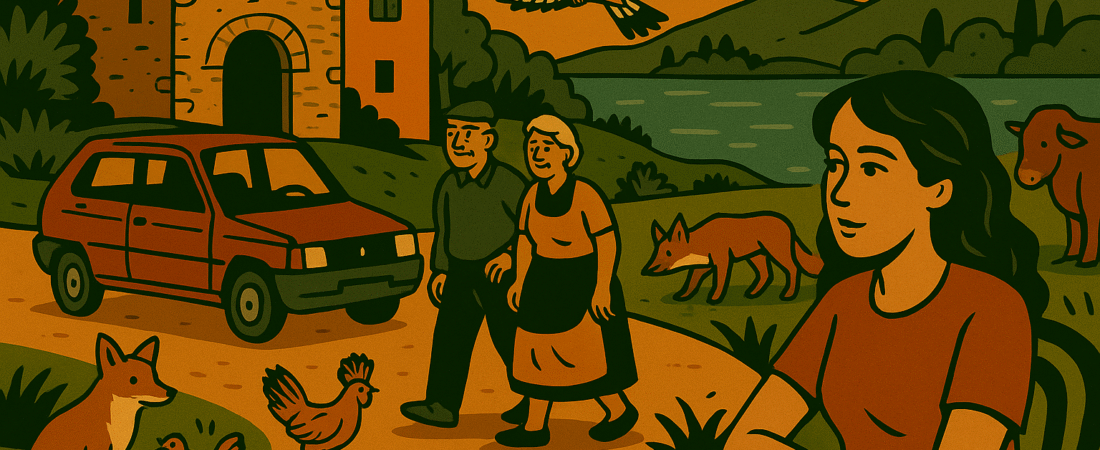I’ve been around. Over forty countries and a lifetime of airports, but there’s still no place like home in summer. Not the lemon-scented Italy of films. Not the chaotic postcards of Rome, Florence, or Venice. I mean the part no one talks about. The one most don’t even know exists. And maybe that’s part of its magic.
We’re in Val Cavallina, tucked between soft-shouldered hills and the blue hush of Lago d’Iseo, with Monte Bronzone keeping quiet guard above. Towns like Adrara San Martino and San Rocco, Gandosso, Villongo, Sarnico—they scatter the slopes like confetti left over from some old celebration, their names familiar to the tongue like the rhythm of an old song.
You don’t arrive here with fanfare. You slip in, like bees moving from elderberry to mallow, blending into the pace. The roads still buckle from decades of patchwork repairs, and even the fanciest car—whether it’s an Alfa, a BMW, or someone’s third-generation Fiat Panda—rattles a little on the way down.
Mornings begin with sound and scent: the low hum of lawnmowers, the hiss of espresso machines, the sweet rot of fruit from the trees mingling with the sharper tang of rubber from nearby factories. And somewhere between all that, a fox slips through a fence as chickens kick up a fuss, the air pulsing with the scent of wet leaves, wild mint, and gossip.
S. is already out—his van lumbering from workshop to factory, always on the hunt for work or a bargain worth flipping. He knows everyone, and everyone knows that if you want to spread a rumour, S. will take it on tour. Not far behind him, M. swipes her sidewalk like she’s defending a fortress, keeping her corner of the world as spotless as her reputation is fierce.
Kids rocket past on souped-up boosters and phantoms, their engines whining through the valley like determined mosquitoes. Somewhere near the Glera, the old crew has reclaimed their concrete throne, sunning themselves by the waterfall’s hush. That’s where you’ll find P., the mayor’s 92-year-old father, eyes sharp under the July sun. He’ll dance with you if you let him, even if it means cutting off his story mid-punchline.
Everywhere, life clings to the details. V. behind the sports bar counter knows who’s cheating, who’s spending too much, and who’s finally pregnant. She could’ve been an interior designer, they say, but she chose espresso and secrets instead. Her bar is ground zero for the afternoon women’s council—half caffe, half confessional.
G. runs her minimarket like a command centre. No one beats her when it comes to slicing prosciutto or judging character. People grumble about her prices but never about her bread. Rumour has it that she once had an affair with the town priest. She never married. She didn’t need to.
The birds gossip too—hoopoes laughing in the trees, buzzards circling slowly over the hills, herons keeping cool by the reeds. You hear it all if you walk long enough. The foxes lope between walnut groves. The roe deer wait till night to leap into your headlights. Badgers grunt, fire salamanders gleam like spilt ink, and marmots whistle somewhere offstage, like forest stagehands keeping time.
G.V., one of the few young ones still betting on the valley, is filming another YouTube video, talking up the local pizzaiolo or giving a tour of a baita. His pizza delivery route doubles as political canvassing—he tried to run for mayor, though the incumbent kept his throne, likely by promising that nothing would ever change.
There’s a smell in the air that no other place can replicate. It’s not just grass or espresso or the lake. It’s cows grazing under walnut trees. It’s fresh bread cooling on windowsills. It’s the warm breath of a people who live in rhythm with the bells on goats, with the weeds sprouting between paving stones, with the boom of blasphemies when two drivers meet at a curve too tight for both.
You eat polenta e coniglio on Sundays. You walk after dinner, or you dance, or you argue politics so fiercely that it ends in a toast. You dress up because there’s always somewhere to go. You see M.B. heading to the salon—her alone-time session, of course. No one else books during her slot. Too many stories, too loud a laugh, too many memories of that married man she stole and returned just in time for the funeral.
There are fewer young faces now. The valley grays with grace. But N., suit-clad and helmeted, still pedals his bicycle from Adrara to Colli di San Fermo, quoting proverbs I suspect he invented for any kid who’ll listen: “Attento Mario, perché le Marie sono furbe” (Careful, Mario, because Marias are cunning) or “Dove c’è Luigi, c’è Parigi.” (Where there’s Luigi, there’s Paris.)
There’s no Uber Eats, no taxis, no Deliveroo. You either drive, walk, or stay home. And most don’t mind. They know the path to the lake by heart. They know the hills, the woods, the shortcuts. They understand that every stone has a story to tell.
And me? I don’t live here anymore. I left a decade ago. Now I return in the summer, drinking in the light, the slowness, the sounds. Fantasising—not mourning—the life I could’ve had. The dialect still rises in my throat. The names still land with weight. The land moves at the pace of memory, and I still belong.


Leave a Reply